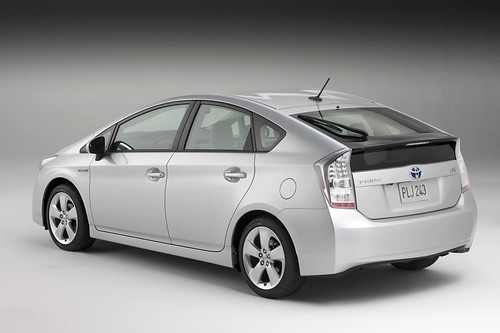Toyota Prius Tops May Auto Sales in Japan; Hybrid Sales Soar in Japan, Despite Downturn
This post is sponsored by LemonFree.com
(Source: Wall Street Journal, Green Car Congress & Tree Hugger)
Last month (May 2009), the Toyota Prius was the top selling model in the world’s second-largest economy; the rival Honda Insight hybrid came in third, according to new car sales rankings—excluding minicars with displacements of less than 660 cc—released by the Japan Automobile Dealers Association (JADA).
In April Honda was quite happy to report that its new Insight hybrid was both the best selling car in Japan for that month (outselling the Toyota Prius) and the first hybrid car to have that honor with 10,481 units. (Earlier post.) In May, the Insight dropped to third place with 8,183 units, behind the Prius and the Honda Fit, with 8,859 units.Toyota’s May performance was all the more surprising, since the third-generation Prius didn’t go on sale until May 18.
was quite happy to report that its new Insight hybrid was both the best selling car in Japan for that month (outselling the Toyota Prius) and the first hybrid car to have that honor with 10,481 units. (Earlier post.) In May, the Insight dropped to third place with 8,183 units, behind the Prius and the Honda Fit, with 8,859 units.Toyota’s May performance was all the more surprising, since the third-generation Prius didn’t go on sale until May 18.
The Prius posted 10,915 units in May, in Japan more than twice the 5,079 units sold in May 2008 and compared to 1,952 units in April 2009, according to the JADA data. (In the US, Toyota reported 10,091 units of the Prius sold in May.)
There are several possible explanations—beyond the fact that both Toyota and Honda have cut prices to make hybrids a little less niche and a little more mass market. First, generous government incentives: Japan’s stimulus package included a range of tax breaks for buyers of hybrid (and electric) vehicles which can knock thousands of dollars off the price tag. Japan has tougher mileage standards—but that affects what kind of cars manufacturers turn out, not what kind of cars consumers flock to. One huge difference is the price of gasoline—which automatically makes the hybrids more attractive, especially in a recession. Japan, like many European countries, slaps a hefty national tax on gas. Right now, Japanese pump prices work out to $4.61 a gallon. That compares to a U.S. national average of about $2.50 a gallon.
Over 1.8 Million new and used cars

